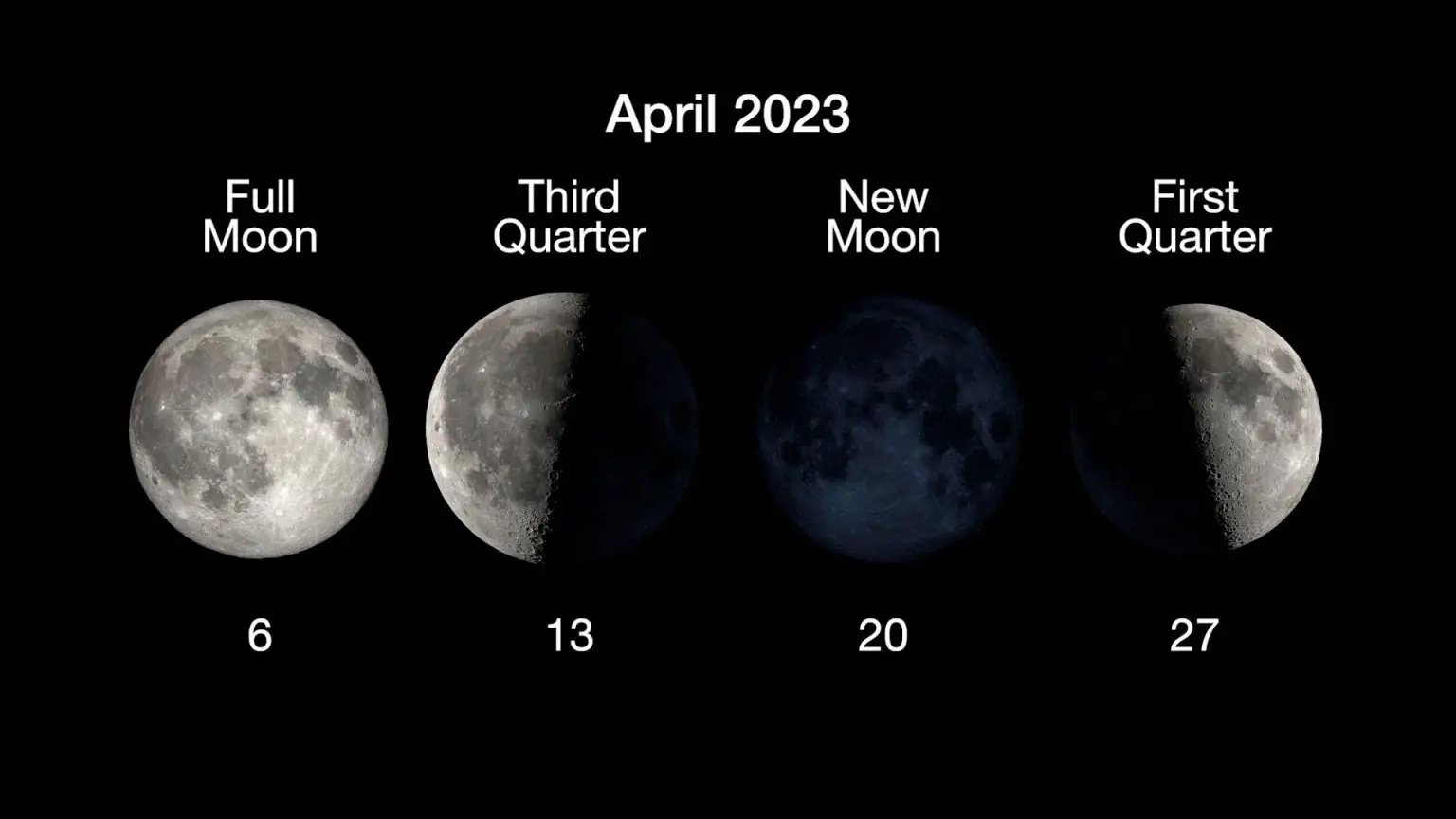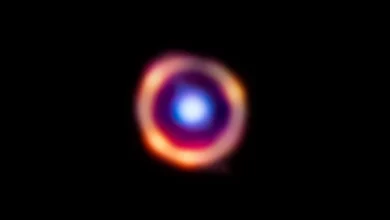
Lead Image: The Maine Farmers’ Almanac started featuring Native American-inspired names for full Moons in the 1930s, which have since become well-known and commonly utilized. As per this almanac, the full Moon in April is referred to as the Pink Moon, a name derived from the herb moss pink. This plant, also called creeping phlox, moss phlox, or mountain phlox, is indigenous to the eastern United States and is among the first widespread blossoms to appear in spring. Credit: NASA/Joel Kowsky
The Next Full Moon is the Pink, Sprouting Grass, Egg, or Fish Moon; the Pesach, Paschal, or Passover Moon; the Hanuman Jayanti Festival Moon; and Bak Poya.
The next full Moon will be on Thursday morning, April 6, 2023, appearing opposite the Sun in Earth-based longitude shortly after midnight at 12:35 a.m. EDT. This will be on Wednesday from Central Time in the USA, Canada, and Mexico and the time zones for Colombia, Peru, and Panama westward across the remainder of the Americas and the Pacific Ocean to Baker Island and the International Date Line West. The bright star Spica will be about 8 degrees to the lower left of the full Moon. The Moon will appear full for 3 days around this time, from Tuesday evening to Friday morning.
The Maine Farmers’ Almanac began publishing “Indian” names for full Moons in the 1930s and these names are now widely known and used. According to this almanac, as the full Moon in April, this is the Pink Moon, named after the herb moss pink, also known as creeping phlox, moss phlox, or mountain phlox, a plant native to the eastern USA that is one of the earliest widespread flowers of spring.
Other names for this Moon include the Sprouting Grass Moon, the Egg Moon, and among coastal tribes the Fish Moon, as this was when the shad swam upstream to spawn.

This is the Pesach or Passover Moon. Pesach or Passover begins at sundown on Wednesday, April 5, and ends at nightfall on Thursday, April 13, 2023. The Seder feasts are on the first two evenings of Passover.
In the Christian ecclesiastical calendar, this is the Paschal Moon, from which the date of Easter is calculated. Paschal is the Latinized version of Pesach. Generally, the Christian holiday of Easter, also called Pascha, is celebrated on the first Sunday after the first full Moon of spring. However, there are differences between the times of these astronomical events and the calendars used by the Eastern and Western churches. This is one of the years where these differences matter. Western Christianity will be celebrating Easter on Sunday, April 9, 2023, the Sunday after this first full Moon of spring. Eastern Orthodox Easter will be a week later on Sunday, April 16.
There are a number of variations of the Hindu lunisolar calendar, but for many this full Moon corresponds with the Hanuman Jayanti festival, the celebration of the birth of Lord Hanuman held in most areas on the full Moon day of the Hindu lunar month of Chaitra.
For Buddhists, especially in Sri Lanka, this full Moon is Bak Poya, commemorating when the Buddha visited Sri Lanka and settled a dispute between chiefs, avoiding a war.
As usual, the wearing of suitably celebratory celestial attire is encouraged in honor of the full Moon. Enjoy the spring flowers, consider acts of charity, be welcoming and leave an extra seat at the table, and avoid starting any wars.
Many lunar and lunisolar calendars start the months on the new Moon with the full Moon in the middle of the month. The twelve lunar cycles in a lunar calendar (such as the Islamic calendar) result in a year about 11 days shorter than the solar year. Lunisolar calendars keep the months tied to the seasons by occasionally adding a “leap” month. This year the Chinese calendar repeats the second month and this full Moon is in the middle of the second of these two second months. In the Hebrew calendar this full Moon is in the middle of Nisan, with Pesach or Passover beginning on the 15th day of Nisan (as mentioned above). In the Islamic calendar his full Moon is near the middle of the holy month of Ramadan. Ramadan is honored as the month in which the Quran was revealed. Observing this annual month of charitable acts, prayer, and fasting from dawn to sunset is one of the Five Pillars of Islam.
As usual, the wearing of suitably celebratory celestial attire is encouraged in honor of the full Moon. Enjoy the spring flowers, consider acts of charity, be welcoming and leave an extra seat at the table, and avoid starting any wars.
As for other celestial events between now and the full Moon after next (with specific times and angles based on the location of NASA Headquarters in Washington, DC):
As spring continues, the daily periods of sunlight continue to lengthen. On Thursday, April 6, 2023 (the day of the next full Moon), morning twilight will begin at 5:46 a.m. EDT, sunrise will be at 6:45 a.m., solar noon will be at 1:11 p.m. when the Sun will reach its maximum altitude of 57.7 degrees, sunset will be at 7:36 p.m., and evening twilight will end at 8:36 p.m. By Friday, May 5 (the day of the full Moon after next), morning twilight will begin at 5:01 a.m., sunrise will be at 6:06 a.m., solar noon will be at 1:05 p.m. when the Sun will reach its maximum altitude of 67.4 degrees, sunset will be at 8:04 p.m., and evening twilight will end at 9:09 p.m..
Meteor Showers
The April Lyrids (006 LYR) are expected to be active between April 20 and 30, 2023, peaking sometime between 1:10 p.m. EDT on April 22 and 12:45 a.m. on April 23. When this peak will occur is uncertain as it has varied in past years. The peak rate also varies, averaging about visible 18 meteors per hour, but reportedly showing higher rates (up to about 23 meteors per hour) when the peak occurs close to the middle of this range (i.e., this year around 9 p.m. on April 22). Meteor rates of more than half the peak have been reported for between 15 and 62 hours centered on the peak, with 32 hours the average range. Short bursts of faint meteors have been reported on a few occasions (including a burst of 90 meteors per hour in 1982).
The expected rate and brightness of these meteors are low enough that urban skywatchers will have little chance of seeing these meteors. You are more likely to see them if you have an unobstructed view with clear skies in a very dark place far from any light sources. The Lyrids will appear to radiate out from near the constellation Lyra, which contains the bright star Vega. For those of us living in the Northern Hemisphere, the best time to look should be the night of April 22 after Lyra has risen above the northeastern horizon (i.e., after about 10:30 p.m. local time) but before the sky shows any signs of dawn the morning of April 23. The Lyrids are caused by debris from comet C/1861 G1 (Thatcher) entering the Earth’s atmosphere at about 49 kilometers per second (110,000 miles per hour).
Ideal viewing conditions would be if the weather cooperates by being clear with no clouds or hazes, you look after Lyra rises (a little before midnight) but before any glow of dawn begins to interfere, you go to a place far from any light sources or urban light pollution, and you have a clear view of a wide expanse of the sky. Be sure to give your eyes plenty of time to adapt to the dark. The rod cells in your eyes are more sensitive to low light levels but play little role in color vision. Your color-sensing cone cells are concentrated near the center of your view with more of the rod cells on the edge of your view. Since some meteors are faint, you will tend to see more meteors from the “corner of your eye” (which is why you need to view a large part of the sky). Your color vision (cone cells) will adapt to darkness in about 10 minutes, but your more sensitive night vision rod cells will continue to improve for an hour or more (with most of the improvement in the first 35 to 45 minutes). The more sensitive your eyes are, the more chance you will have of seeing meteors. Even a short exposure to light (from passing car headlights, etc.) will start the adaptation over again (so no turning on a light or your cell phone to check what time it is).
The other known meteor showers in this lunar cycle are predicted to be barely detectable, best seen only from the Southern Hemisphere, or difficult to see due to interference from the nearly full Moon.
Evening Sky Highlights
On the evening of Wednesday, April 5, 2023 (the start of the night of the full Moon), as evening twilight ends (at 8:34 p.m. EDT), the rising full Moon will be 14 degrees above the east-southeastern horizon. Three of the five visible planets will be in the sky, with the brightest being Venus (as the evening star) at 24 degrees above the western horizon, Mercury (second brightest) at 6 degrees above the west-northwestern horizon, and Mars (third brightest) at 62 degrees above the west-southwestern horizon. The bright star appearing nearest to overhead will be Pollux (the brighter of the twin stars in the constellation Gemini) at 77 degrees above the southwestern horizon. Pollux is an orange tinted star about 34 light-years from Earth. It is not quite twice the mass of our Sun but about 9 times the diameter and 33 times the brightness. Also spread across the southwestern sky will be the constellation Orion and the band of bright stars from the local arm of our home galaxy, including the brightest star in our night sky, Sirius, at 30 degrees above the south-southwestern horizon.
As this lunar cycle progresses, Mars and the background of stars will appear to shift westward each evening (as the Earth moves around the Sun), with Mars moving more slowly (as it too is moving in the same direction). Initially bright Venus and Mercury will appear to move slowly the other direction. April 11 will be when Mercury will reach its highest above the horizon (as twilight ends) for this apparition, after which it will start shifting towards the horizon again. April 23 will be the last evening Mercury will be above the horizon as twilight ends, but it may still be visible in the glow of dusk until about April 27. Mercury will pass between the Earth and the Sun on May 1. May 2 will be when Venus will reach its highest above the horizon (as twilight ends) for this apparition, after which it too will start shifting towards the horizon again. The Moon will appear near the bright star Spica on April 5 and 6, Mercury on April 20 (setting before twilight ends), Venus on April 22 and 23, Mars on April 25, Pollux on April 26, Regulus on April 29, and Spica on May 3.
On the evening of Friday, May 5, 2023 (the night of the full Moon after next), as evening twilight ends (at 9:09 p.m. EDT), the rising full Moon will be 7 degrees above the east-southeastern horizon. Two of the five visible planets will be in the sky, bright Venus (as the evening star) at 26 degrees above the western horizon and Mars at 45 degrees above the western horizon near the bright star Pollux (Mars and Pollux will be at their closest a few evenings later). The bright star appearing closest to overhead will be Regulus, the brightest star in the constellation Leo the lion, at 61 degrees above the south-southwestern horizon. Although we see Regulus as a single star, it is actually four stars (two pairs of stars orbiting each other). Regulus is about 79 light years from us.
Morning Sky Highlights
On the morning of Thursday, April 6, 2023 (the day of the full Moon), as morning twilight begins (at 5:46 a.m. EDT), the setting full Moon will be 13 degrees above the west-southwestern horizon with the bright star Spica 6 degrees to the left of the Moon. The only planet visible will be Saturn at 7 degrees above the east-southeastern horizon. The bright star closest to overhead will be Vega, the brightest star in the constellation Lyra the lyre, at 78 degrees above the eastern horizon. Vega is one of the three bright stars in the Summer Triangle along with Deneb, and Altair. Vega is the 5th brightest star in our night sky, about 25 light-years from Earth, has twice the mass of our Sun, and shines 40 times brighter than our Sun.
As this lunar cycle progresses, the Moon will still appear near Spica on April 7, Antares on April 10, the planet Saturn on April 16, and Spica on May 4. By the morning of Friday, May 5, 2023 (the day of the full Moon after next), as morning twilight begins (at 5:01 a.m. EDT), the setting full Moon will be 9 degrees above the west-southwestern horizon. The only planet visible will be Saturn at 18 degrees above the east-southeastern horizon, although the planet Jupiter may be visible rising in the glow of dawn after morning twilight begins. The bright star Vega will appear almost directly overhead at 88.5 degrees above the western horizon.
Detailed Daily Guide
Here for your reference is a day-by-day listing of celestial events between now and the full Moon after next. The times and angles are based on the location of NASA Headquarters in Washington, DC, so some of these details may differ for your location (I use parentheses to indicate specific times that might be different for you).
March 31, 2023
At 7:18 a.m. EDT, the Moon will be at apogee, its farthest from the Earth for this orbit.
April 1-2, 2023
The bright star Regulus will appear near the waxing gibbous Moon. Regulus will be 6.5 degrees below the Moon as evening twilight ends (at 8:30 p.m. EDT) and will be 6 degrees to the lower left as the Moon reaches its highest in the sky for the night 2 hours later (at 10:26 p.m.). Regulus will be less than 4 degrees to the lower left of the Moon when Regulus sets below the west-northwestern horizon on Sunday morning (at 5:18 a.m.) about a half-hour before morning twilight begins.
April 6, 2023
As mentioned above, the next full Moon will be shortly after midnight on Thursday morning, April 6, 2023, at 12:35 a.m. EDT. The Moon will appear full for 3 days around this time, from Tuesday evening to Friday morning. As evening twilight ends on Wednesday (at 8:34 p.m.), the bright star Spica will be 10 degrees below the Moon on the east-southeastern horizon. By the time the Moon reaches its highest in the sky on Thursday morning (at 1:14 a.m.), Spica will be 8 degrees to the lower left. As morning twilight begins (at 5:46 a.m.), Spica will be 6 degrees to the left.
By Thursday evening, as evening twilight ends (at 8:36 p.m. EDT), the full Moon will have shifted to the other side of the bright star Spica. As evening twilight ends Spica will be 4 degrees to the upper right of the Moon. Spica will shift clockwise and shift away from the Moon as the night progresses, appearing 7 degrees to the lower right by the time morning twilight begins on Friday morning (at 5:45 a.m.).
April 10, 2023
The bright star Antares will appear near the waning gibbous Moon. As Antares rises on the southeastern horizon around midnight (Sunday night at 11:57 p.m. EDT) it will be 1.6 degrees below the Moon. Less than 2 hours later (at around 1:50 a.m.) the pair will be near their closest with Antares 0.8 degrees to the lower right of the Moon. The Moon will reach its highest in the sky about 2.5 hours after that (at 4:31 a.m.) with Antares 1.2 degrees to the right, and morning twilight will begin about an hour after that (at 5:40 a.m.) with Antares 1.6 degrees to the right.
April 11, 2023
On Tuesday evening, the Pleiades star cluster will appear about 3 degrees to the right of the bright planet Venus. As evening twilight ends (at 8:41 p.m. EDT) Venus will be 25 degrees above the western horizon. Venus will set on the west-northwestern horizon a little over 2 hours later (at 11:01 p.m.).
The planet Jupiter will be passing on the far side of the Sun as seen from the Earth, called conjunction. Jupiter will be shifting from the evening sky to the morning sky and will begin emerging from the glow of the dawn on the east-northeastern horizon in early May (depending upon viewing conditions).
Tuesday evening also will be the evening when the planet Mercury will be at its highest above the west-southwestern horizon (7 degrees) as evening twilight ends (at 8:41 p.m. EDT). Tuesday will also be when Mercury reaches its greatest angular separation from the Sun as seen from the Earth for this apparition (called greatest elongation).
April 13, 2023
The waning Moon will appear half-full as it reaches its last quarter at 5:11 a.m. EDT.
April 15, 2023
On Saturday night at 10:25 p.m. EDT, the Moon will be at perigee, its closest to the Earth for this orbit.
April 16, 2023
On Sunday morning, the planet Saturn will appear 5 degrees above the waning crescent Moon. Moonrise on the east-southeastern horizon (at 4:45 a.m. EDT) will be about 45 minutes before morning twilight begins. By the time twilight begins (at 5:30 a.m.) the Moon will be 6 degrees above the horizon.
April 20, 2023
Just after midnight on Thursday morning, at 12:13 a.m. EDT, will be the new Moon, when the Moon passes between the Earth and the Sun and usually is not visible from the Earth.
However, from Australia, Indonesia, the Philippines, Papua New Guinea, and their environs, the silhouette of the Moon will be visible crossing in front of the Sun. For a narrow strip starting from the southern Indian Ocean, passing over the ocean between Australia and Asia, and ending up in the Pacific near the Marshall Islands and Kiribati, the Moon will completely block the Sun in a total solar eclipse. This eclipse is what is called a hybrid eclipse.
Near the start and at the end of the eclipse, when viewers on the round Earth are farther away from the Moon, the Moon’s silhouette will be smaller and not block the Sun completely, so the eclipse starts and ends with what is called an annular eclipse. During the part of the eclipse where the Sun is completely blocked, it is safe to look directly at the eclipse, but whenever part of the Sun is visible (such as when the eclipse is starting or ending, or in an annular eclipse when the Moon blocks the center of the Sun creating the appearance of a ring of fire), it is not safe to look directly at the eclipse.
The day of or the day after the New Moon marks the start of the new month for most lunisolar calendars. The third month of the Chinese calendar starts on Thursday.
In the Islamic calendar the months traditionally start with the first sighting of the waxing crescent Moon. Many Muslim communities now follow the Umm al-Qura Calendar of Saudi Arabia, which uses astronomical calculations to start months in a more predictable way. This calendar predicts the holy month of Ramadan will end and Shawwāl will begin with sunset on Thursday evening. Because of the religious significance of the end of Ramadan, Shawwāl is one of 4 months in the Islamic year where the start of the month is updated in the Umm al-Qura Calendar based upon the actual sighting of the crescent Moon. Starting with the sighting of the crescent Moon, the end of the Ramadan fast will be celebrated with Eid al-Fitr (the Feast of Breaking the Fast), a celebration lasting from 1 to 3 days.
If we are able to see the thin, waxing crescent Moon on Thursday evening, it will appear 5 degrees below the planet Mercury. You will need a very clear view of the west-northwestern horizon (and possibly binoculars). The earliest you might be able to see the Moon in the glow of dusk will be about halfway between sunset and the end of evening twilight (at 8:20 p.m. EDT) when the Moon will be 3 degrees above the horizon. The Moon will set 20 minutes later (at 8:40 p.m.), which will be 11 minutes before twilight ends. Twilight will end (at 8:51 p.m.) and Mercury will set 19 minutes later (at 9:10 p.m.). Higher in the sky to the left will be the Pleiades star cluster and the bright planet Venus.
April 21, 2023
Sundown marks the start of Iyar in the Hebrew calendar.
By Friday evening, the waxing crescent Moon will have shifted to about halfway between the planet Mercury and the Pleiades star cluster, with Venus shining brightly higher in the sky. As evening twilight ends (at 8:52 p.m. EDT) Mercury will be 2 degrees above the west-northwestern horizon and the Moon 9 degrees above the horizon. Mercury will set first 14 minutes later (at 9:06 p.m.), with the Moon setting 44 minutes after that (at 9:50 p.m.).
April 22, 2023
The bright planet Venus will appear 6 degrees above and to the left of the waxing crescent Moon, with the Pleiades star cluster about the same distance below the Moon. The Moon will be 20 degrees above the west-northwestern horizon as evening twilight ends (at 8:54 p.m. EDT) and will set 2 hours later (at 10:59 p.m.).
As mentioned in the summary above, the Lyrid meteor shower will peak Saturday evening, with the best time to see these meteors from North America (if the weather is clear and you are in a very dark location) expected to be late Saturday night into early Sunday morning.
April 23, 2023
Sunday evening will be the last evening the planet Mercury will appear above the west-northwestern horizon as evening twilight ends, although it will still be visible in the glow of dusk until about April 27.
Also on Sunday evening, the bright planet Venus will appear 5 degrees below the waxing crescent Moon. The Moon will be 31 degrees above the western horizon as evening twilight ends (at 8:55 p.m. EDT). Venus will set first on the west-northwestern horizon 2.5 hours later (at 11:25 p.m.).
April 25-26, 2023
On Tuesday evening into early Wednesday morning, the planet Mars will appear near the waxing crescent Moon. The Moon will be 51 degrees above the western horizon as evening twilight ends (at 8:57 p.m. EDT) with Mars 3 degrees to the left. Mars will set first on the west-northwestern horizon 4.5 hours later on Wednesday morning (at 1:33 a.m.). The bright star Pollux, the brighter of the twin stars in the constellation Gemini, will appear above the Moon and Mars.
April 26-27, 2023
On Wednesday evening into early Thursday morning, the bright star Pollux, the brighter of the twin stars in the constellation Gemini, will appear near the waxing crescent Moon. The Moon will be 60 degrees above the west-southwestern horizon as evening twilight ends (at 8:58 p.m. EDT) with Pollux 4 degrees to the right. Pollux will set first on the northwestern horizon a little over 5 hours later on Thursday morning (at 2:19 a.m.).
April 27, 2023
The Moon will appear half-full as it reaches its first quarter at 5:20 p.m. EDT.
April 28, 2023
Friday morning at 2:44 a.m. EDT, the Moon will be at apogee, its farthest from the Earth for this orbit.
April 29, 2023
Early on Saturday morning, April 29, 2023, before the Moon sets on the west-northwestern horizon (at 3:31 a.m. EDT), the bright star Regulus will appear less than 8 degrees to the left of the Moon.
By Saturday evening, as evening twilight ends (at 9:02 p.m. EDT), the Moon will have shifted such that the bright star Regulus will appear 5 degrees to the lower right of the Moon. The pair will appear to separate, with Regulus setting first on the west-northwestern horizon early Sunday morning (at 3:27 a.m.).
May 1, 2023
Monday morning will be the first morning that the planet Jupiter will be above the east-northeastern horizon 30 minutes before sunrise, an approximation of the first morning it may first be visible in the glow of dawn.
On Monday afternoon, the planet Mercury will be passing between the Earth and the Sun as seen from the Earth, called inferior conjunction. Mercury will be shifting from the evening sky to the morning sky and will begin emerging from the glow of dawn on the east-northeastern horizon about 10 days later.
May 2, 2023
Tuesday evening will be when the bright planet Venus will appear at its highest above the west-northwestern horizon as evening twilight ends, nearly 27 degrees. Because the angle of the line between the Sun and Venus and the line of the horizon changes with the seasons, the date when Venus appears highest above the horizon as evening twilight ends is not when Venus and the Sun appear farthest apart as seen from the Earth, which will occur on June 4.
May 3-4, 2023
Wednesday night into Thursday morning, the bright star Spica will appear less than 3 degrees to the lower right of the waxing gibbous Moon. The Moon will be 30 degrees above the southeastern horizon as evening twilight ends (at 9:07 p.m. EDT). The Moon will reach its highest in the sky less than 3 hours later (at 11:52 p.m.). By the time morning twilight begins (at 5:03 a.m.) Spica and the Moon will be low on the west-southwestern horizon
May 5, 2023
The full Moon after next will be Friday afternoon at 1:34 p.m. EDT. Observers who can see the Moon at this time (e.g., in Africa, Asia, and Australia) will likely not notice the slight dimming of the Moon as it passes through the partial shadow of the Earth in a penumbral lunar eclipse. The Moon will appear full for 3 days around this time, from early Thursday morning through early Sunday morning.





